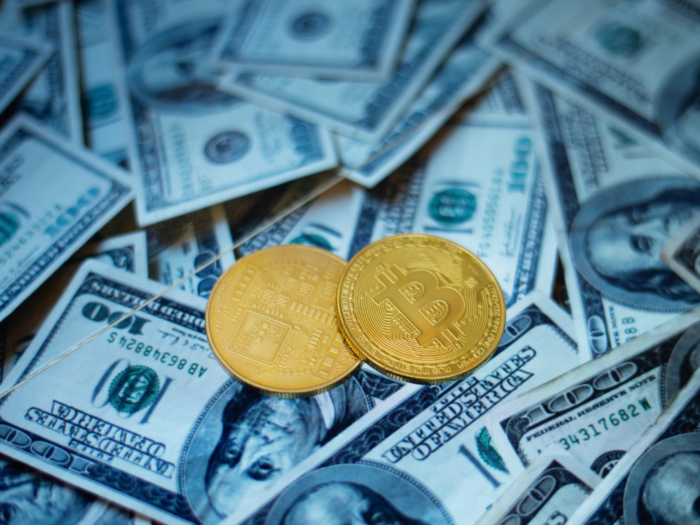
Canva

Non-fungible tokens add a second layer of volatility, to a market segment that is already subject to large swings in price. For instance, a CryptoPunk avatar NFT may be bought for 1000 ETH tokens, and then lose value on two fronts – its price denominated in Ethereum, and the dropping value of Ethereum itself.
Moreover, in addition to NFT marketplaces like OpenSea that charge a 2.5% commission on transactions, newer NFT projects like Pavia include a further royalty of 2.5% levied each time an NFT changes hands.

When a person ‘owns’ coin on an exchange, what they really mean is that the exchange maintains a wallet on their behalf. Keeping cryptocurrencies in an exchange wallet is usually free, selling it to gain cash in the bank account is minimally priced. But, moving that coin to a personally-owned wallet carries a cost. For instance, WazirX will charge 0.0006 BTC or ₹1960, to move a minimum of 0.0012 BTC or ₹3930.
The people who would move their coin out of an exchange-managed wallet, are those who are security or privacy minded, or those trying to benefit from price arbitrage. In addition, the user may be responsible for NEFT or UPI charges for transferring money from the exchange to their bank accounts.

The act of purchasing a blockchain based cryptocurrency, means a new block needs to be written to confirm who the new owner is. This can only be done by ‘crypto miners’, who are faced with limits of the crypto network, and thus prioritise transactions which offer higher processing fees — more money.
Over time, the network fee to process individual transactions (also called gas fees) has kept rising.
To be fair, the current gas fees of Ethereum is less than three paise per Ether token, and ₹240 per Bitcoin. Yet, this is the most unpopular part of crypto transactions — even decentralised exchanges (DEXs) cannot escape it. Moreover, this network fee has to be paid every time a purchase or sale is made, and can rise to higher levels for short periods of time if there are too many transactions coming in.

Individual crypto exchanges may have ‘order books’ consisting of differing proportions of buyers and sellers. This could lead to some platforms costing consistently more or less, to buy a cryptocurrency.
For example, at the time of writing, buying one Bitcoin costs ₹34.25 lakh on WazirX, while the same costs ₹32.8 lakh on Coinbase. However, users could sell at corresponding price levels as well. This is why the price difference can be maintained without ‘price arbitrage’ by investors — making it less profitable to buy cheaper Bitcoin on Coinbase and then sell it on WazirX.
Simply put, price arbitrage happens when a person buys a cryptocurrency where it’s cheaper and then sells it where it is costlier, to profit from the price difference. But factors such as fees and currency conversion costs end up equalising the effective price. This ‘spread’ between buying and selling prices is largely down to market demand, but a sliver of profits from here go towards the exchange, as exchanges themselves hold vast amounts of coins.

The next step is to actually buy the coin of choice, such as Bitcoin and Ethereum. On average, the applicable fees with an exchange like WazirX is 0.2% , while Coinbase may charge upto 0.5%. In addition, an exchange may set a minimum order size such as ₹50, or minimum trade size, such as 0.0001 BTC, claimed to be for efficiency.
These charges go towards the exchange. In addition, there may be exchange membership fees for investors who trade at higher tiers, or perks for members who have verified their identity.

The first step for most people when they’re going online to buy any cryptocurrency, is to move money from a bank account into a crypto exchange. While there are many ways to do so, restrictions in India means that at least a few exchanges like Vauld, prefer using an intermediary like Mobikwik. Depending on the money transfer method, Mobikwik may charge as high as 3.95% plus GST. On the other hand, for the few exchanges that support receiving money through UPI, this charge could be zero, but may take time until the money reflects in the exchange wallet.
The deposit fees, or the UPI and IMPS charges, go to the payment gateway.
 I spent 2 weeks in India. A highlight was visiting a small mountain town so beautiful it didn't seem real.
I spent 2 weeks in India. A highlight was visiting a small mountain town so beautiful it didn't seem real.  I quit McKinsey after 1.5 years. I was making over $200k but my mental health was shattered.
I quit McKinsey after 1.5 years. I was making over $200k but my mental health was shattered. Some Tesla factory workers realized they were laid off when security scanned their badges and sent them back on shuttles, sources say
Some Tesla factory workers realized they were laid off when security scanned their badges and sent them back on shuttles, sources say Stock markets stage strong rebound after 4 days of slump; Sensex rallies 599 pts
Stock markets stage strong rebound after 4 days of slump; Sensex rallies 599 pts
 Sustainable Transportation Alternatives
Sustainable Transportation Alternatives
 10 Foods you should avoid eating when in stress
10 Foods you should avoid eating when in stress

Copyright © 2024. Times Internet Limited. All rights reserved.For reprint rights. Times Syndication Service.